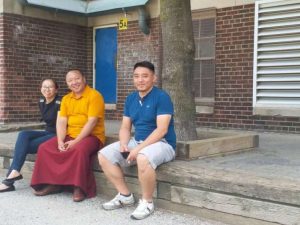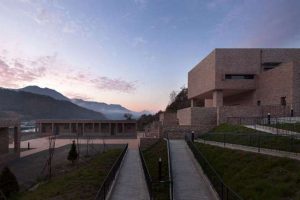Jungto Society, the international Buddhist community founded by the revered Korean Dharma master and social activist Venerable Pomnyun Sunim (법륜스님), this month hosted an intensive week-long study tour in South Korea for female monastics and activists affiliated with the International Network of Engaged Buddhists (INEB).
Eleven Buddhist women from five nations and territories in Asia—two from Bhutan, one from China, three from Ladakh, India, two from Sri Lanka, and three from Thailand—gathered for the “2024 Women’s INEB Jungto Society Study Tour” from 1–7 November. In a warm and welcoming atmosphere of kalyana-mitrata* the participants gathered to practice, learn, connect, and exchange ideas, with three underpinning objectives: to learn how Ven. Pomnyun Sunim and Jungto Society are implementing the Buddha’s teachings in modern society through exposure to Jungto Society’s activities and philosophy; to overcome gender discrimination in Buddhist communities and promote the status of female Buddhist activists; and to explore the challenges and solutions facing female social activists.
INEB is a global network of individuals and organizations who are committed to building compassionate societies and working toward environmental sustainability and world peace. INEB emphasizes the importance of developing ethical, Dharma-based approaches to its work, and encourages members to work collaboratively and respectfully based on a foundation of shared values and aspirations. Headquartered in Bangkok, INEB has established a wide range of social projects and outreach programs aimed at overcoming suffering and empowering vulnerable communities through the practice of the Dharma and social programs such as education and training, community development, advocacy and lobbying efforts, and interfaith dialogue.
Led by Ven. Pomnyun Sunim and coordinated by the committed and tireless volunteers who make up Jungto Society, and Anchalee Kurutach, a member of INEB’s Executive Committee and coordinator of INEB’s Regional Network for Peacebuilders project, the study tour’s exhaustive itinerary included visits to Buddhist monasteries and temples across South Korea, group presentations and discussions, Dharma talks, and Buddhist practice. All of this was aimed at providing an opportunity for the participants to meet and connect, and to present and exchange ideas for expressing and practicing engaged Buddhism in today’s increasingly polarized world.
“This was actually our second study tour for this year. The first was in May for Buddhist monastics, which has been ongoing annually for some time,” Anchalee told BDG. “A couple of years ago, INEB’s executive secretary, Somboon Chungprampree, proposed to Ven. Pomnyun Sunim that we conduct a study tour exclusively for female activists. And building on that proposal, I suggested that we also need to include female monastics, mainly so that we could provide an environment in which they didn’t feel inhibited by the presence of male monastics as a consequence of the Vinaya and the rules that they have to observe in those situations. In the end, we went with an even split between lay women and bhikshunis, which has made the group all the more enriching for everyone.
“Our purpose has been to create a dedicated space for female activists and practitioners to interact with Sunim, and with Jungto Society, and really to enable deeper and richer learning opportunities during these study tours,” Anchalee emphasized.
Jungto Society is a volunteer-run community that aspires to embody the Buddhist teachings through social engagement, and by promoting a simple lifestyle centered on sustainable living. The community seeks to address the crises of modern society, such as greed, poverty, conflict, and environmental degradation, by applying a Buddhist worldview of interconnectedness and living in line with the principle that everyone can find happiness through Buddhist practice and active participation in social movements.
“This first study tour for female practitioners included: three nuns, Ven. Jigmet, Ven Palzes, and Ven. Lhadon from the Ladakh Nuns Association; from Thailand, Ven. Ben, a meditation instructor and white-robed nun (Thai: maechi*); and two samaneris (female novices) from Sri Lanka, Ven. Viharani Theri and Ven. Silananda,” Anchalee explained. “Then we had two lay women from Bhutan, Tshewang and Kezang, who work with Dr. Tashi Zangmo and the Bhutan Nuns Foundation; one lay woman from Thailand, Ben, who has been working with the Spirit in Education Movement (SEM) toward peace-building and addressing social issues in Myanmar; and one lay woman, DongDong, from the Ananda Cultural Center in China. Eleven in all, including me!”
“Overall, this has been a resounding success. Each participant left the study tour with a renewed commitment to their Buddhist practice and also to adopting innovation approaches to their work,” observed Anchalee. “One of the key aspects of this study tour has been that the educational program was led by female Dharma teachers from Jungto Society, which I think was so important for both Jungto and the participants. It showed the strength and depth of Jungto Society beyond the leadership of Ven. Pomnyun Sunim. The Dharma teachers designed the study tour program, led the Awakening Retreat for us, and provided role-model examples of female community leadership—especially Dharma teacher Deokseong, who accompanied us throughout the entire schedule. It’s so important for people to recognize the role that these teachers and leaders play in a community context.”
The study tour was broad in scope while offering opportunities to dig deeply into key issues for engaged Buddhists, introducing the history of Korean Buddhism and the emergence of Jungto Society and its mission as a Dharma community with a unique volunteer-based structure. The participants also engaged in dialogues and exchanges with Korean bhikshunis on monastery management, practice methods, bhikshuni training, and social engagement, and experienced practical organic farming, and learned about socially engaged organizations, sustainable living, peace-making, and humanitarian relief.
On the final day of the study tour, the participants gathered to share their experiences and learning points, and to hear concluding remarks from Ven. Pomnyun Sunim:
When I first met you all, I was pleased to hear about the activities you’re doing in each country. I was particularly impressed by the medical volunteer work for residents in Ladakh. In fact, activities that address the health issues of residents are very necessary in poor countries. There are many areas that don’t require much expense and can be done without professional medical staff. I thought it would be good if such aspects were well developed.
I hold the view that people should basically live independently. This is because all living beings in nature live on their own. When they receive support from outside, their wildness or self-reliance is mostly damaged. For example, livestock live with the help of humans. In return, they have to provide labor. If not, they must provide milk or meat; there’s always a price to pay for support. That’s why it’s important to be self-reliant whenever possible. Although being self-reliant is difficult, it’s the only way to become the master of one’s own life.
However, there are cases in nature where self-reliance is not possible. This is the case with offspring. For humans, we can say it’s during those years as a minor. Apart from that, there are no living beings in nature that survive on external support. However, in the case of humans, when it’s difficult to live alone, such as when people are sick, old, or disabled, they live with help from others, whereas in nature, they would be naturally eliminated.
Therefore, we need to be very careful when helping those in need. First, we should not help in a way that undermines their self-reliance. Second, we should not support anything that encourages desire. While this might be possible in general society, for practitioner groups like us who follow the Buddha’s teachings, we should not provide support that encourages desire. We should always support in a way that allows those receiving help to be the primary agents, further developing their self-reliance. . . .
However, in modern society, even helping others has become quite commercialized. These days, TV advertisements often show images of people living in poverty and misery to play on people’s emotions to raise funds. I don’t think this approach is desirable. When I visit areas struck by earthquakes or floods for international relief work, I often see that the suffering on the ground is used as a means for fundraising. In a way, it could be seen as a business that feeds off people’s misfortunes. As practitioners, we should not engage in this type of charitable work. We should help with what they truly need, adhering to the principle of not undermining their self-reliance or encouraging greed. If these principles and conditions are met, I am willing to help improve the lives of people regardless of their country or religion. It’s about transferring resources or goods from those who have a little extra to those who lack.
However, the fundamental principle that practitioners should hold is to prioritize alleviating people’s spiritual suffering through the Buddhadharma. I believe that material support is also necessary when people face temporary difficulties due to major disasters. This is because the Buddha said that offering food to the hungry and medicine to the sick is as meritorious as making offerings to the Buddha. I hope that your activities will not only alleviate the suffering of sentient beings through the Buddhadharma but also provide material support to those in real need, thus addressing their suffering in these two ways. (Jungto Society)
Ven. Pomnyun Sunim, the guiding Dharma teacher of Jungto Society, is a widely respected author and social activist. He has founded numerous organizations, initiatives, and projects across the world. In October 2020, The Niwano Peace Foundation in Japan presented the 37th Niwano Peace Prize to Ven. Pomnyun Sunim in recognition of the revered monk’s international humanitarian work, environmental and social activism, and his tireless efforts to build trust and goodwill between communities of different faiths and cultures, toward the goal of world peace.***
* Kalyana-mitrata (Skt.), Kalyaṇa-mittata (Pali); the Buddhist concept of virtuous spiritual friendship.
** Maechis wear white robes to distinguish them from Buddhist monks and lay people. They are not fully ordained as the full ordination of women is not yet recognized by Thailand’s monastic authorities, despite the existence in Thailand of female monastics who have been ordained in other countries..
*** Buddhist Monk Ven. Pomnyun Sunim Awarded the 37th Niwano Peace Prize (BDG)
See more
International Network of Engaged Buddhists (INEB)
Jungto Society
Jungto Society International
How can we reach an agreement when we have different opinions? (Jungto Society)
Related news reports from BDG
Engaged Buddhism: INEB’s Young Bodhisattva Program for Youth Leaders Commences in Taiwan
Engaged Buddhism: INEB to Hold 21st Biennial Conference “Buddhist Heritage: Toward Inclusive Societies” in Chennai
Engaged Buddhism: INEB’s SENS Transformative Learning Program Accepting Applications for 2025 Intake
Engaged Buddhism: Ven. Pomnyun Sunim Inaugurates Water Pipelines in Rural Bhutan
Engaged Buddhism Update: Ven. Pomnyun Sunim Returns to Türkiye to Inaugurate Post-Earthquake School Project
Engaged Buddhism Special Report: Ven. Pomnyun Sunim Explores Sustainable Development at Three-Day Workshop in Bhutan
Related features from BDG
Daughters of the Buddha: Unmun-sa, a Wellspring of Bhikshuni Ordination in South Korea, Part One
Daughters of the Buddha: Unmun-sa, a Wellspring of Bhikshuni Ordination in South Korea, Part Two
Ten Years of Empowering Female Monastics: Bhutan Nuns Foundation Extends Reach with New Training Center


































